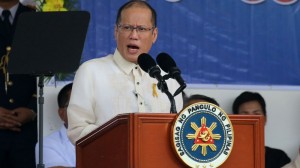ZAMBOANGA CITY – A 78-year-old Zamboangueña mother is pleading to President Benigno Aquino III to also come to the rescue of her son, who is on death row in Malaysia.
Teresita Quijano said like Mary Jane Veloso, the Filipino who recently got a reprieve from facing death by firing squad in Indonesia, her son, Jerry, is also innocent of the charges.
READ: Veloso execution stopped
READ: Timeline: The case of Mary Jane Veloso
Jerry, a contract carpenter, was arrested at the Kota Kinabalu Airport in Sabah, Malaysia on April 3, 2008 when airport authorities there found some 759 grams of shabu on a package he was carrying.
Teresita said her son was not aware that the package he was asked to deliver to Sabah contained illegal substance.
“He was just told to deliver a package, if he knew it contained drugs, he would never bring it,” she said.
Teresita said he managed to visit Jerry in Kota Kinabalu once and talked with him after his arrest – with the help of the money she got from selling her house.
She said Jerry was being locked up at the Penjara Kapayan jail in Kota Kinabalu after he was sentenced to death by hanging on September 3, 2010.
Teresita said she hopes that President Aquino would also intervene so that her son will be spared from the gallows.
“I am old and my son’s case in Malaysia came in 2008 yet. We don’t have money to pursue his case there. I am appealing to (the President) to help us while there is time,” Teresita said.
The Inquirer learned that aside from Jerry, two more Filipinos also face death for drug trafficking in Malaysia.
They are Timhar Jumdani Ong and his wife, Nurie.
READ: More Filipinos on death row in Malaysia, Saudi, China
The couple was arrested in one of the hotels in Kota Kinabalu on August 11, 2005 for possession of 336.66 grams of methamphetamine hydrochloride. They were sentenced to death in September 2006 and were awaiting execution.
Mayor Maria Isabelle Salazar said she spearheaded a move to secure reprieve for the Ongs when she was still a congressman.
“I personally elevated the case to President Aquino and was also raised during the visit of the Malaysian deputy speakers to Congress and if I am not mistaken, to Malaysian Foreign Minister. Of late, no news of execution nor reprieve. Perhaps, the (Department of Foreign Affairs) can provide update on this,” Salazar said.
More than 1,100 out of the 2,940 Filipinos being detained in various prison facilities in Sabah, Malaysia face drug-related charges, the state’s prisons director said.
The state-run Bernama said in a report quoting Sabah Prisons Director Ab Basir Mohamad that “about 40 percent of the Filipino inmates (there) are serving sentences for drug offenses.”
There were 6,500 inmates in various jails in Sabah and 58 percent of them or 3,770 were foreigners, Basir said.
Of the number of foreign inmates, 78 percent (2,940) were Filipinos, 17 percent were Indonesians and the remaining percentage a mixture of nationalities, he added.
Malaysia’s Dangerous Drugs Act, which was revised in 1989, prescribes death penalty for convicted drug traffickers.
Drug trafficking in Malaysia is described as the possession of at least 15 grams of heroin and other illegal substance or 200 grams of cannabis.
Last month, Malaysian police authorities also arrested three undocumented Filipinos following a raid on a house in Labuan town in Sabah, according to another Bernama report on Tuesday.
The report did not name the arrested suspects but added that one of them was a 59-year old man, who was peddling shabu.
Quoting Supt. Adzhar Othman, Bernama said that a police narcotics team raided an unnumbered house in Kampong Saguking and arrested the elderly man, along with two other men – aged 26 and 29 – on Monday evening.
Seized from the older man, Adzhar said, were 14 plastic sachets of white crystalline substance weighing more than 6 grams.
The seized substance could fetch up to RM1,000 (about P12,000).
The three suspects all tested positive for drug use, according to Adzhar.
All three men had been charged under Malaysia’s Dangerous Drugs Act. Julie Alipala with a report from Allan Nawal


